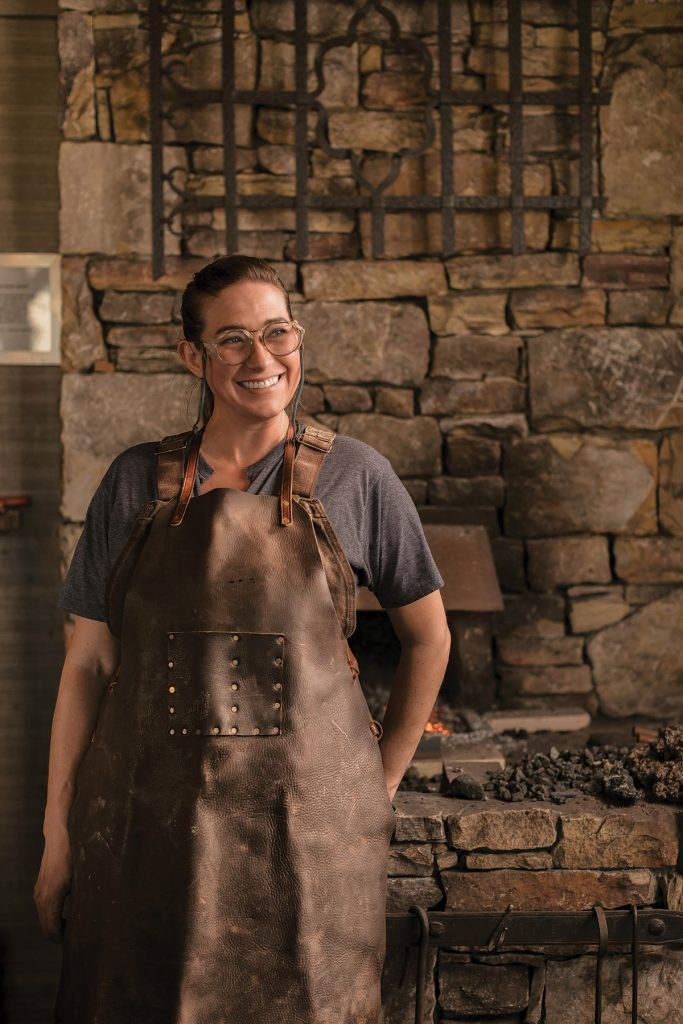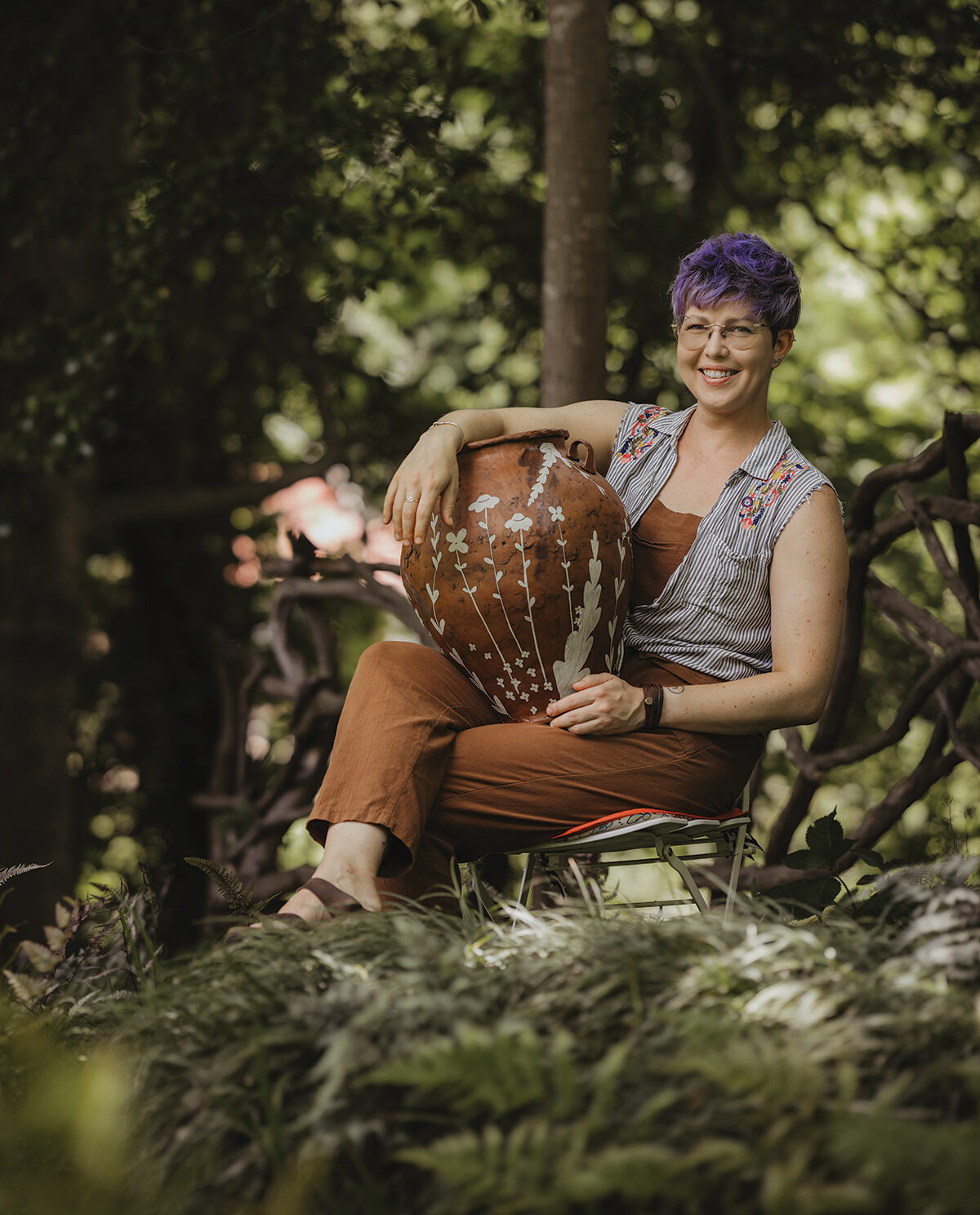Tryon Arts & Crafts School welcomes former student as blacksmithing instructor

Four-hundred students, three years, one new forge: Autumn Day on the job.
Portrait by Jack Robert
The foothills of the Carolinas have long been a cradle for American craft movements. Handmade art and objects can be found everywhere — along with the skilled individuals who make them.
Autumn Day is a blacksmith. She spends most of her time in a smithy (a blacksmith’s workshop) using a forge (where the fire is). “I’m working with bituminous coal that burns around 3,600 degrees,” Day says. The hard, black coals have to get hot enough to melt metal: “Most of the metal we work with is a mild steel that melts at 3,200 to 3,400 degrees.”

Photo by Jack Robert
To be a blacksmith, “you need a hammer, a fire that gets hot enough, some metal to beat … and something to beat it on,” says Day. “I have an attraction to metal and the different forms that it takes.” Teaching others the craft is also her passion and profession. “I love it. It’s amazing, because when people enjoy it, they really enjoy it.”
Day first fell in love with the forge when she took an elective course in blacksmithing at UNC Charlotte. Eight years later, her skills advanced when she took a class at Tryon Arts and Crafts School. “I took a bladesmithing course from Gerry Drew. We made a knife. It was the best knife I ever made,” Day says.

SOMETHING NEW, SOMETHING OLD
Autumn Day has demonstrated smithy techniques on period-correct 1800s forges, but at Tryon Arts & Crafts School, a new, state-of-the-art facility (named for late TACS student Shane Urquhart) will enhance learning opportunities.
Photo by Jack Robert
Metallurgy, the science of the behavior of metallic elements, is involved in smithing tools and blades. It takes a person with Drew’s advanced skills to be able to harden and temper metal correctly. “To teach that is really special,” says Day. “I learned a lot from [Drew].”
Now, Day is returning to the school where she leveled up her skills, teaching her own monthly blacksmith workshops at Tryon. Her four-hour course will show beginners the basic forge setup and techniques. Every student will take home their own finished fire poker, dinner bell, or hook.

Photo by Jack Robert
Most first-time students are surprised by how physical blacksmithing is. After graduating from UNCC, Day blacksmithed for the Poplar Grove Plantation Historic Site in Wilmington. “There, it’s a period-correct forge for the 1800s,” she says. “I used a double-chambered bellows. I had to pull on a lever and every pull was ten pounds. It took 50 pulls to get your metal up to heat.” While building arm strength, Day also refined her instruction skills by teaching classes and doing historical reenactments for Poplar Grove’s visitors.
“I’ve taught over 400 students in the past three years,” Day tells Bold Life. “Certain people have a talent for it, but you don’t have to have talent to pursue it and be good at it.”

It’s a 3,600-degree work day when bituminous coal is involved.
Photo by Jack Robert
Blacksmithing always attracts a diverse group of students. Women will sometimes buy a class for their husbands, but decide to tag along. “They end up being the ones who want a forge in their backyard,” says Day.
In the future, she would love the opportunity to teach children. “I’ve seen the work that they do. They don’t have preconceived notions of things. I’m hoping to teach a youth course … I wish it was something I was exposed to when I was 14.”

Photo by Jack Robert
Some of Day’s former students have gone on to launch their own successful businesses, selling hand-forged wares. She’s not interested in doing that, but if a historic home needs to replace its hinges or shutter stays, “I think it’s really fun to be able to make [functional objects] in the way they were when the home was originally built,” she notes.
Every blacksmith has a signature style in the way they hold their hammer: “Like looking at a painting’s brushstrokes, you can see the hammer movements on the metal. That’s one of the things I like about blacksmithing. [Everything’s] handmade — it should be different.”
Day discovered Tryon Arts and Crafts school all those years ago when she needed it most. “My opportunities to blacksmith were few. I was very happy when I went down to Tryon, because their location is central and they offered courses I could afford.”
Anyone age 14 or above can register for one of Day’s community-oriented classes on the TACS website.
“Learn something,” she says. “That’s the best way to start.”
Tryon Arts & Crafts School, 373 Harmon Field Road, Tryon. “Beginning Blacksmithing with Autumn Day” happens Thursday, April 22, 9am-1pm. Cost is $75/members, $90/nonmembers, plus a $20 materials fee. The school will host a public event, “Art of Flame: A Day of BBQ, Craft & Games” on Saturday, May 1. For updates on this event, call 828-859-8323 or see tryonartsandcrafts.org.



